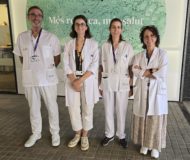

Vitamin D supplementation may have effects that go far beyond bone metabolism. In patients with decompensated cirrhosis, correcting vitamin D deficiency is associated with improvements in frailty, muscle strength, inflammation, and cognitive function—especially working memory. These findings are supported by two articles recently published in the scientific journals Medical Sciences and Nutrients as part of a multidisciplinary, international collaboration coordinated by Hospital Gregorio Marañón in Madrid and Hospital de Sant Pau in Barcelona.
The studies were led by the Departments of Digestive Diseases at Hospital Gregorio Marañón and Hospital de Sant Pau–Sant Pau Research Institute (IR Sant Pau), along with the Sant Pau University School of Nursing. They were conducted in collaboration with research groups from CIBERehd and CIBERSAM and the University of Melbourne (Australia). The work was supported by the European Commission and the Carlos III Health Institute.
The first study, published in Medical Sciences, showed that vitamin D supplementation, as part of a multifactorial nutritional intervention, significantly improves frailty and muscle strength and mass in patients with decompensated cirrhosis and vitamin D deficiency.
The study included 39 patients who had recently been hospitalized for complications related to liver cirrhosis. Once low vitamin D levels were confirmed, treatment with supplements was initiated in accordance with current clinical guidelines, along with other micronutrients as needed. Over a 12-month period, researchers assessed the impact of this intervention on frailty (Fried index), handgrip strength, body composition, and quality of life.
“Our research group has been studying frailty in cirrhosis for years. We knew that vitamin D deficiency is very common in patients with advanced cirrhosis, but until now, there was no solid evidence on whether treating it had a real clinical impact on frailty.” This is explained by Dr. Germán Soriano, researcher in the Digestive Diseases group at IR Sant Pau and clinical lead at Hospital de Sant Pau. He is one of the corresponding authors of the study.
After six months, patients showed a significant improvement in the Fried frailty index and a sustained increase in muscle strength throughout the year-long follow-up. At 12 months, there was also an increase in lean and fat mass. “Most importantly, not only did biochemical and nutritional parameters improve, but so did clinical and functional variables such as grip strength, anxiety levels, and quality of life,” notes Dr. Soriano. “This has important implications for the well-being and independence of these patients.”
The observational study highlights a low-cost, easily implemented strategy to improve the functional status of individuals with advanced liver disease—a particularly vulnerable population. “Improving frailty may reduce the risk of further hospitalizations, falls, and mortality. Incorporating vitamin D deficiency screening and treatment into routine clinical management of these patients could make a meaningful difference,” Dr. Soriano concludes.
The second study, published in Nutrients, showed that vitamin D supplementation can improve cognitive function and reduce inflammation in patients with decompensated cirrhosis. This is one of the most severe forms of chronic liver disease and is characterized by chronic inflammation, impaired immune response, and often, cognitive dysfunction. In this context, the researchers hypothesized that vitamin D deficiency—very common in these patients—could be contributing to these impairments.
“Our data suggest that vitamin D plays a key role in regulating inflammation and cognitive performance in patients with advanced cirrhosis,” says Dr. Rita García-Martínez of Hospital Gregorio Marañón, who led the project at that site.
The study included 39 patients with decompensated cirrhosis and vitamin D deficiency. Twenty-seven completed six months of follow-up, and 22 were evaluated at the 12-month mark. All patients received a daily oral vitamin D supplement aimed at restoring adequate blood levels of the vitamin.
Results indicated that patients with lower vitamin D levels had poorer cognitive function, particularly in tasks involving working memory and learning. Similarly, patients with higher levels of inflammatory markers such as the cytokine IL-1β also performed worse on tasks requiring processing speed and attention. After supplementation, not only was there a significant improvement in cognitive performance, but levels of certain proinflammatory cytokines, including IL-1β and IL-6, were also reduced. “These findings strengthen the link between systemic inflammation and cognitive impairment in cirrhosis, opening the door to possible therapeutic interventions,” notes Dr. Rafael Bañares, a physician in the Digestive Diseases Department at Hospital Gregorio Marañón. Along the same lines, Dr. García-Martínez points out that vitamin D “could become a safe, affordable, and easy-to-administer therapeutic tool to prevent common complications in patients with advanced liver disease.”
The results of these two studies underscore the need not to underestimate vitamin deficiencies in patients with cirrhosis, especially in the decompensated stages of the disease. Vitamin D supplementation appears to be a low-cost, accessible, and safe strategy with potential impact on quality of life, functional autonomy, and clinical prognosis in these patients.
The researchers also included a gender-based analysis, identifying some differences in clinical response to supplementation. “It’s essential to consider sex and gender in clinical care. In this case, both women and men showed clear improvements in muscle strength, indicating that supplementation is beneficial across genders,” emphasizes Dr. Soriano.
The researchers advocate for the systematic screening and treatment of vitamin D deficiency in the follow-up protocols for patients with decompensated cirrhosis as a complementary tool to improve their functionality, well-being, and clinical outcomes. “Our results support incorporating this practice routinely as an additional and effective resource in the comprehensive care of these patients,” concludes Dr. García-Martínez.